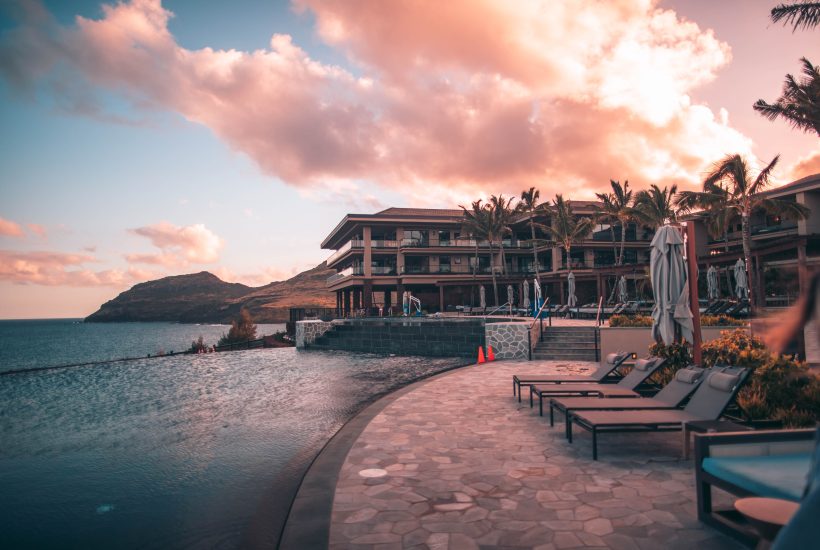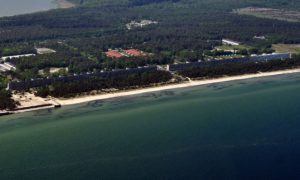Featured
Environmentalists Launch Crowdfunding to Stop Sandra Ortega’s Luxury Resort in Portugal
An environmental study carried out by the promoters of the crowdfunding project indicates that the ‘Na Praia’ resort, which Sandra Ortega is promoting through the Ferrado Na Comporta subsidiary, will have a “negative, direct, certain, permanent, irreversible, large-scale and very significant” impact on the area, which is known for its biodiversity.

After the exit of Room Mate and the rescue and return to profit of her main real estate company, Ferrado, Sandra Ortega is straightening her investments in the hotel sector, although this does not mean that they are free of controversy. The luxury resort she is building on the Tróia peninsula, in Portugal, has become the target of criticism from various environmental groups who claim that it will have an impact on the dunes in the area where it is planned. In fact, an initiative promoted by these groups has launched a crowdfunding campaign to finance the legal battle aimed at paralyzing a complex with a budget of around €200 million.
The initiative, promoted by the Grupo de Estudos de Ordenamento do Território e Ambiente and the Plataforma Dunas Livres, alerts to the existence of several resorts and luxury tourist complexes being built on the peninsula that “threaten the 40 km of Costa Azul between Tróia and Melides.”
Read more on the subject and find the latest business news of the day with the Born2Invest mobile app.
Negative impact
An environmental study carried out by the promoters of the crowdfunding project indicates that the ‘Na Praia’ resort, which Sandra Ortega is promoting through the Ferrado Na Comporta subsidiary, will have a “negative, direct, certain, permanent, irreversible, large-scale and very significant” impact on the area, which is known for its biodiversity. In addition, they argue that the start of the project was developed without the necessary authorizations and with “a certain opacity in the legal frameworks.” This winter, when the Dunas Livres Platform announced its crowdfunding campaign and assured that “the licensing of the project has not yet been concluded, despite the fact that the Grândola City Hall issued a precarious shipyard license on the same day that the platform filed a complaint with the authorities for the start of illegal works on the site.”
The environmental collective went so far as to request a copy of the license for the resort owned by Amancio Ortega’s eldest daughter to evaluate its development. According to them, this access was denied on several occasions until the environmentalists threatened to go to court. According to Dunas Livres, the municipality of Grândola, where the project is being developed, was in favor of providing the documents but requested a financial contribution for this purpose.
Initially, the crowdfunding campaign was born with the aim of raising the €1,180 that in theory cost the required document, although, at this time, the campaign has been extended to the goal of €20,000. At the moment, the environmental platform has raised about €7,500.
Crowdfunding website
The criticisms of environmental groups are not only focused on Sandra Ortega’s luxury resort. The proliferation of several tourist projects in the peninsula has triggered the alarms of these groups that denounce the overcrowding generated by the nearly 30,000 tourist beds projected in the municipality of Grandola. Grupo Pestana, Amorim Luxury, or Coporgest have also joined to exploit the new Ibiza with tourist ventures.
Five-star hotel
But, in the same way that the ‘Na Praia counts’ complex has its detractors, it also has its followers, due to the economic impact that, they say, it will generate in the area. The tourist complex will rise on the land that the richest woman in Spain bought from Sonae Capital in 2016 for about €50 million. It is expected to have a five-star hotel, three tourist centers, and sports and leisure facilities. In total, it is estimated to total more than half a thousand beds. At the end of 2019, the Portuguese government approved a series of tax benefits for the project, due to the investment and the expected job creation: 161.1 million euros and 318 jobs by the end of December 2023. According to the Portuguese press, work would have started by the end of 2021.
That year, when the mayor of the municipality of Grândola announced the imminent start of the works, he stressed that the initial project had undergone changes “in accordance with the recommendations of various entities, especially those linked to the environment.”
__
(Featured image by Roberto Nickson via Unsplash)
DISCLAIMER: This article was written by a third party contributor and does not reflect the opinion of Born2Invest, its management, staff or its associates. Please review our disclaimer for more information.
This article may include forward-looking statements. These forward-looking statements generally are identified by the words “believe,” “project,” “estimate,” “become,” “plan,” “will,” and similar expressions. These forward-looking statements involve known and unknown risks as well as uncertainties, including those discussed in the following cautionary statements and elsewhere in this article and on this site. Although the Company may believe that its expectations are based on reasonable assumptions, the actual results that the Company may achieve may differ materially from any forward-looking statements, which reflect the opinions of the management of the Company only as of the date hereof. Additionally, please make sure to read these important disclosures.
First published in Economia Digital Galicia, a third-party contributor translated and adapted the article from the original. In case of discrepancy, the original will prevail.
Although we made reasonable efforts to provide accurate translations, some parts may be incorrect. Born2Invest assumes no responsibility for errors, omissions or ambiguities in the translations provided on this website. Any person or entity relying on translated content does so at their own risk. Born2Invest is not responsible for losses caused by such reliance on the accuracy or reliability of translated information. If you wish to report an error or inaccuracy in the translation, we encourage you to contact us.

-

 Markets3 days ago
Markets3 days agoWeather-Driven Supply Outlook Lifts Coffee Markets in Brazil and Vietnam
-

 Markets1 week ago
Markets1 week agoCotton Market Weakens Amid Demand Concerns and Bearish Trends
-

 Business1 day ago
Business1 day agoTopRanked.io Weekly Affiliate Digest: What’s Hot in Affiliate Marketing [Best Technology Affiliate Programs]
-

 Fintech1 week ago
Fintech1 week agoFintech Alliances and AI Expand Small-Business Lending Worldwide














